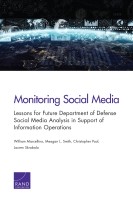| 来源类型 | Research Reports
|
| 规范类型 | 报告
|
| DOI | https://doi.org/10.7249/RR1742
|
| ISBN | 9780833098207
|
| 来源ID | RR-1742-OSD
|
| Monitoring Social Media: Lessons for Future Department of Defense Social Media Analysis in Support of Information Operations |
| William Marcellino; Meagan L. Smith; Christopher Paul; Lauren Skrabala
|
| 发表日期 | 2017
|
| 出版年 | 2017
|
| 页码 | 92
|
| 语种 | 英语
|
| 结论 |
Social Media Analysis Could Play a Valuable Role in DoD Information Operations- Social media analysis can provide important information about adversaries, supporting communities on either side of a conflict, or other key populations. It can also inform efforts to target messages to particular audiences or influence the perceptions, decisions, or behaviors of a group.
- Social media platforms allow users to share text, images, and videos quickly as events occur. Monitoring this traffic will help ensure that U.S. forces are prepared to respond to developing events or the spread of deceptive information.
- U.S. service members' social media use can compromise operational security. Social media analysis could support DoD's prevention efforts.
- Crowdsourcing and social media monitoring have played a critical role in humanitarian relief efforts and other civil-military operations by providing the real-time updates needed for a timely and effective response.
Current Legal Structures and Policies Were Not Designed for Information Operations- U.S. law and policy have not kept up with changing adversaries and changes in the types of activities in which U.S. forces engage. Uncertainty about which types of activities are permitted under law is a disincentive for commanders to engage in information operations.
- Laws intended to protect privacy and restrict domestic surveillance do not account for key characteristics of social media, such as the intermingling of domestic and foreign communication and the risk that collecting data on another country's populace could involve accidental data collection on U.S. persons.
|
| 摘要 |
- DoD should conduct a legal review and establish clear policies on the use of social media analysis to support information operations. It should also formulate clear guidelines on data collection, storage, and dissemination.
- DoD should directly connect efforts to expand its social media analysis capability with existing information-related capabilities and current threats and operational needs.
- DoD should weigh the costs and benefits of using open-source versus commercial technologies and training military personnel to conduct social media analysis versus relying on contractors to perform these tasks.
|
| 主题 | Cyber and Data Sciences
; Databases and Data Collection
; Analysis
; and Processing
; Information Operations
; Information Privacy
; Social Media Analysis
; United States Department of Defense
|
| URL | https://www.rand.org/pubs/research_reports/RR1742.html
|
| 来源智库 | RAND Corporation (United States)
|
| 引用统计 |
|
| 资源类型 | 智库出版物
|
| 条目标识符 | http://119.78.100.153/handle/2XGU8XDN/108668
|
推荐引用方式
GB/T 7714 |
William Marcellino,Meagan L. Smith,Christopher Paul,et al. Monitoring Social Media: Lessons for Future Department of Defense Social Media Analysis in Support of Information Operations. 2017.
|
|
文件名:
|
x1537981415169.jpg
|
|
格式:
|
JPEG
|

|
文件名:
|
RAND_RR1742.pdf
|
|
格式:
|
Adobe PDF
|
除非特别说明,本系统中所有内容都受版权保护,并保留所有权利。